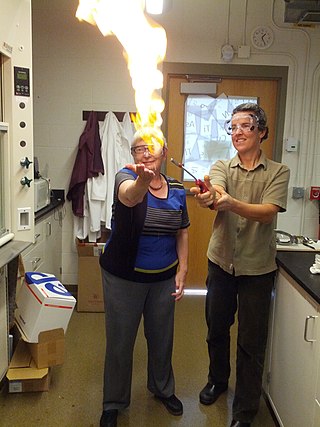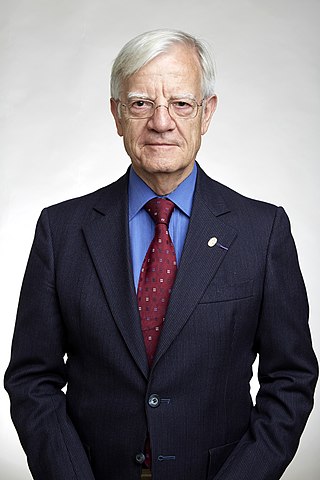Related Research Articles
Paul Werner Gast was an American geochemist and geologist.

The Mineralogical Society of America (MSA) is a scientific membership organization. MSA was founded in 1919 for the advancement of mineralogy, crystallography, geochemistry, and petrology, and promotion of their uses in other sciences, industry, and the arts. It encourages fundamental research about natural materials; supports the teaching of mineralogical concepts and procedures to students of mineralogy and related arts and sciences; and attempts to raise the scientific literacy of society with respect to issues involving mineralogy. The Society encourages the general preservation of mineral collections, displays, mineral localities, type minerals and scientific data. MSA represents the United States with regard to the science of mineralogy in any international context. The Society was incorporated in 1937 and approved as a nonprofit organization in 1959.

The Geochemical Society is a nonprofit scientific organization founded to encourage the application of chemistry to solve problems involving geology and cosmology. The society promotes understanding of geochemistry through the annual Goldschmidt Conference, publication of a peer-reviewed journal and electronic newsletter, awards programs recognizing significant accomplishments in the field, and student development programs. The society's offices are located on the campus of the Carnegie Institution for Science in Washington, DC.
The Society for Research in Child Development (SRCD) is a professional society for the field of human development, focusing specifically on child development. It is a multidisciplinary, not-for-profit, professional association with a membership of approximately 5,500 researchers, practitioners, and human development professionals from over 50 countries. The purposes of the society are to promote multidisciplinary research in the field of human development, to foster the exchange of information among scientists and other professionals of various disciplines, and to encourage applications of research findings.
The Association of Applied Geochemists (AAG) is an international society that seeks to advance the study and application of geochemistry and represents scientists working in that field.

Alexandra Navrotsky is a physical chemist in the field of nanogeoscience. She is an elected member of the United States National Academy of Sciences (NAS) and the American Philosophical Society (APS). She was a board member of the Earth Sciences and Resources division of the NAS from 1995 until 2000. In 2005, she was awarded the Urey Medal, by the European Association of Geochemistry. In 2006, she was awarded the Harry H. Hess Medal, by the American Geophysical Union. She is currently the director of NEAT ORU, a primary program in nanogeoscience. She is distinguished professor at University of California, Davis.
Syed Mahmood Naqvi was an Indian Earth scientist specialising in geochemistry at the National Geophysical Research Institute (NGRI) in Hyderabad. In a four-decade career, from the 1960s through 2000s, he was the recipient of numerous awards, scientific as well as humanitarian, and served as Fellow of the Association of Applied Geochemists, Indian Geophysical Union, Andhra Pradesh Academy of Sciences and Indian National Science Academy (INSA) as well as vice-president of the Geological Society of India, the Geological Mining and Metallurgical Society of India and the Indian Society of Applied Geochemists (ISAG).

Donald James DePaolo is an American professor of geochemistry in the department of earth and planetary science at the University of California, Berkeley and associate laboratory director for energy and environmental sciences at the Lawrence Berkeley National Laboratory.
Georges Calas is professor of mineralogy (Emeritus) at Sorbonne Université and an honorary Senior Member of University Institute of France.
The International Association of Geoanalysts is an international not-for-profit learned society. Its objectives are to: "serve as an international forum for the advancement of geoanalytical science and to promote the interests and support the professional needs of those involved in the analysis of geological and environmental materials".
Isabel Patricia Montañez is a paleoclimatologist specializing in geochemical records of ancient climate change. She is a Distinguished Professor and a Chancellor's Leadership Professor in the Department of Earth and Planetary Sciences at University of California, Davis. As of 2021, Montañez is the director of the UC Davis Institute of the Environment.

Frederick T. Mackenzie is an American sedimentary and global biogeochemist. Mackenzie applies experimental and field data coupled to a sound theoretical framework to the solution of geological, geochemical, and oceanographic problems at various time and space scales.

Janne Blichert-Toft is a geochemist, specializing in the use of isotopes with applications in understanding planetary mantle-crust evolution, as well as the chemical composition of matter in the universe. To further this research, Blichert-Toft has developed techniques for high-precision Isotope-ratio mass spectrometry measurements.
Bhamidipati Lakshmidhara Kanakadri Somayajulu (1937-2016) is an Indian geochemist and a CSIR Emeritus Scientist at Physical Research Laboratory, Ahmedabad. He is known for his studies on ancient and contemporary marine processes and is an elected fellow of several science societies such as the National Academy of Sciences, India, Geological Society of India, Indian Geophysical Union, American Geophysical Union, European Association for Geochemistry, Indian Academy of Sciences and the Indian National Science Academy. The Council of Scientific and Industrial Research, the apex agency of the Government of India for scientific research, awarded him the Shanti Swarup Bhatnagar Prize for Science and Technology, one of the highest Indian science awards for his contributions to Earth, Atmosphere, Ocean and Planetary Sciences in 1978.
Erik Harold Hauri was an American geochemist at the Carnegie Institution for Science. He researched the movement of matter inside planets and how volatile compounds such as water originated on Earth and other planetary bodies, and their effects on volcanic systems.

Albrecht (Al) Werner Hofmann, ForMemRS, is emeritus professor at the Max Planck Institute for Chemistry and an adjunct professor at Columbia University. He is best known for his contributions to the field of geochemistry.
Rosalind Emily Majors Rickaby is a professor of biogeochemistry at the Department of Earth Sciences, University of Oxford and a Professorial Fellow at University College, Oxford. She is an Emeritus Fellow of Wolfson College, Oxford.

Kristín Vala Ragnarsdóttir is an Icelandic Earth and sustainability scientist and activist who is Professor of Sustainability Science in the Faculty of Earth Sciences and the Institute of Earth Sciences at the University of Iceland. She was the first woman to be a full professor in Earth Sciences at the University of Bristol in the UK and at the same time the first woman to become a full professor in the Science Faculty there. She was also the first woman to serve as Dean of a School at the University of Iceland.
T. Mark Harrison is an isotope geochemist based in California. He is Distinguished Professor of Geochemistry in the Department of Earth, Planetary and Space Sciences, University of California – Los Angeles.
Nicolas Dauphas is a French planetary scientist and isotope geochemist. He is a professor of geochemistry and cosmochemistry in the Department of the Geophysical Sciences and Enrico Fermi Institute at the University of Chicago. His research focuses on isotope geochemistry and cosmochemistry. He studies the origin and evolution of planets and other objects in the solar system by analyzing the natural distributions of elements and their isotopes using mass spectrometers.
References
This article needs additional citations for verification .(May 2010) |
- ↑ "Home". eag.eu.com.
- ↑ "Awards | European Association of Geochemistry".